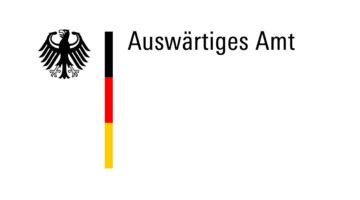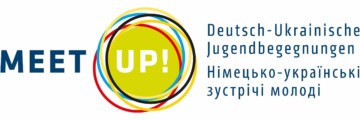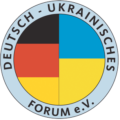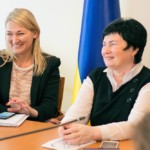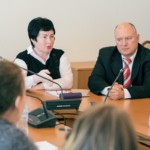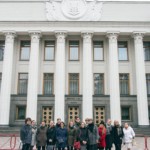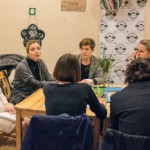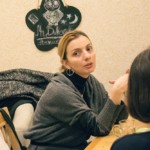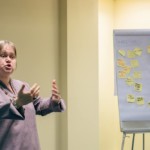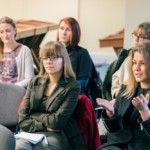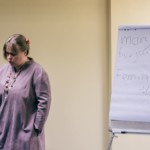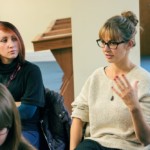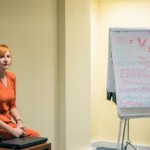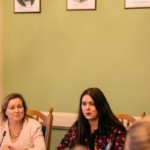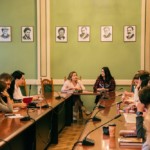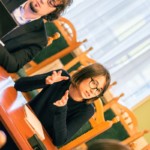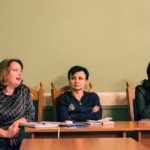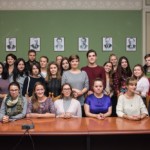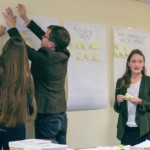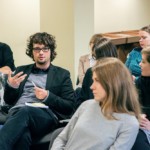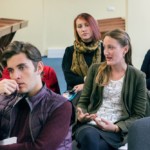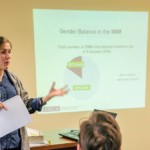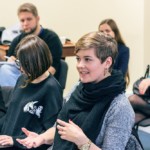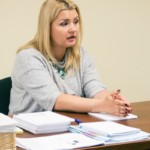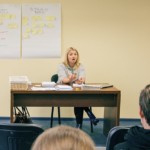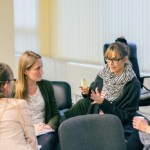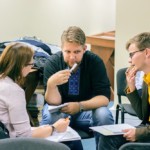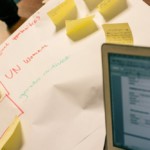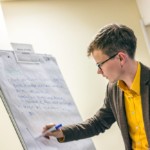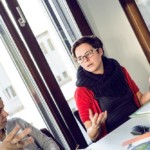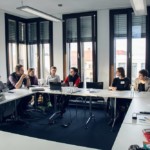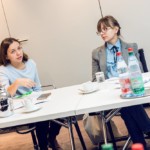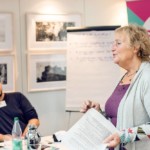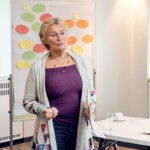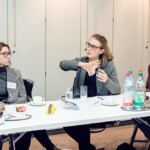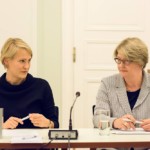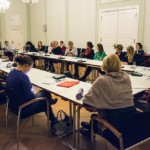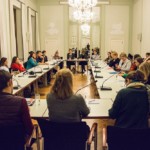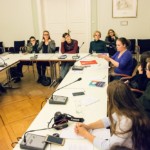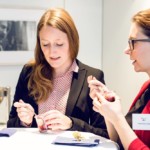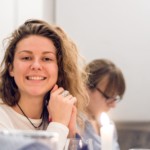BEYOND THE PROTOCOL
WOMEN AND INTERNATIONAL POLITICS IN GERMANY AND UKRAINE
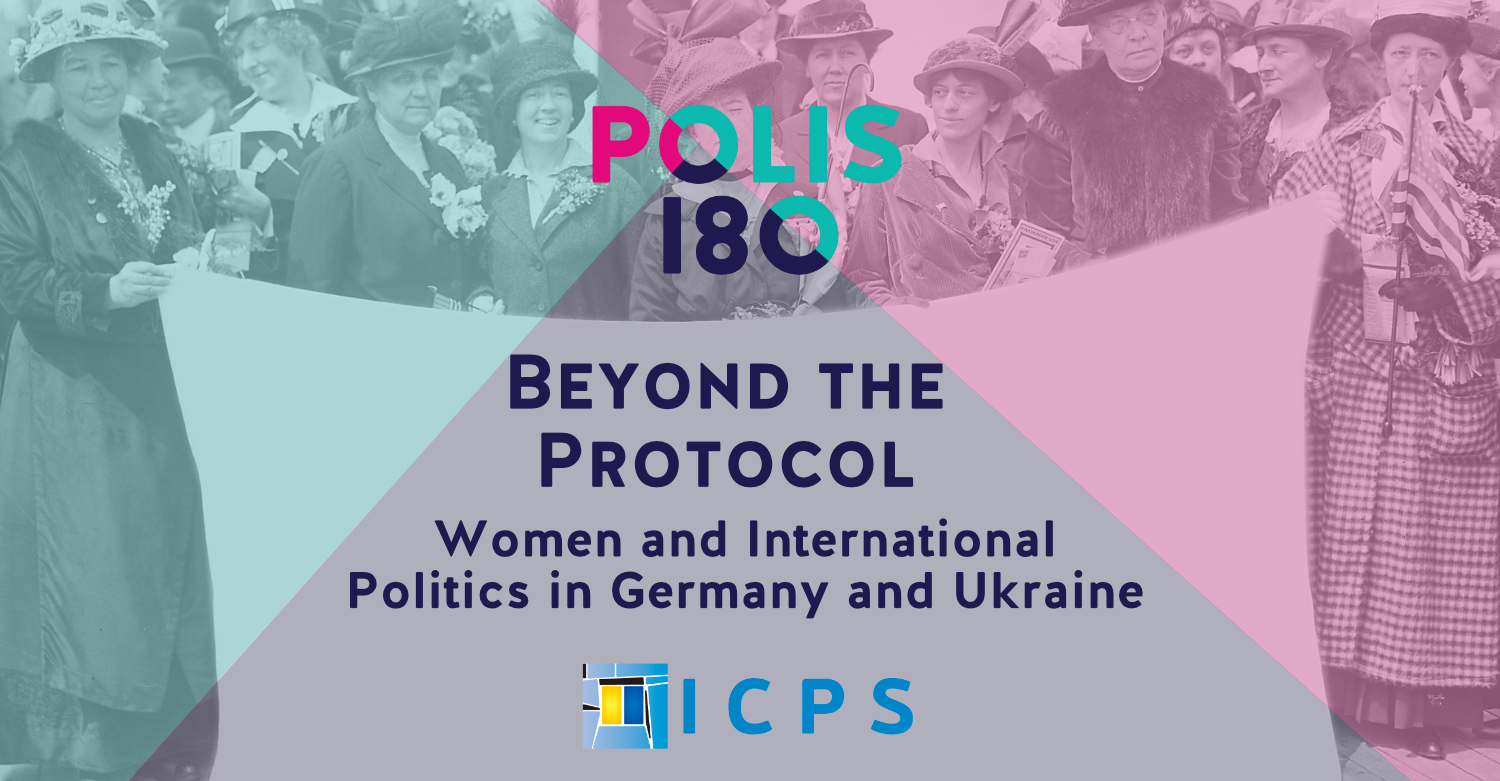
Two workshops in Kyiv and Berlin discussing the role of women in peace and security with high-ranking experts involved in foreign policy-making, international negotiation processes, research and gender mainstreaming
Kyiv (9 – 14 October 2016) and Berlin (20 – 25 November 2016)
In cooperation with with the Kyiv-based International Centre for Policy Studies (ICPS)
Under the patronage of Manuela Schwesig, German Federal Minister of Family Affairs, Senior Citizens, Women and Youth and Hanna Hopko, Ukrainian Member of Parliament and Chairperson of the parliamentary Foreign Affairs Committee
Funded by the German Foreign Office and the Robert Bosch Foundation under the umbrella program “Meet Up! – German-Ukrainian youth encounters” of the Foundation “Remembrance, Responsibility and Future” (Stiftung “Erinnerung, Verantwortung, Zukunft”), and generously supported by the Alfred-Herrhausen-Gesellschaft and the German-Ukrainian Forum
[youtube https://www.youtube.com/watch?v=peHUWlyFjJM&w=560&h=315]
THE IDEA
Foreign policy and diplomacy have traditionally been male domains. The relative absence of women in foreign policy in the domestic and international realm, and most notably in international peace and security, is striking.
- A 2015 ICPS survey shows that only 11 percent of the current Ukrainian parliamentarians are women.
- Despite a remarkable 47 percent overall share of women within the German Ministry of Foreign Affairs, only 25.7 percent of the leadership positions were filled by women in 2014 (Kienbaum: Frauen – Macht – Regierung 2014).
- UN Women revealed that within 31 major peace processes between 1992 and 2011, only 4 percent of signatories, 2.4 percent of chief mediators, 3.7 percent of witnesses and 9 percent of negotiators were women.
At the same time, various studies have shown that taking into account women’s views and experiences in conflict resolution, that is, engaging them „beyond the protocol“, often leads to less militarized and more sustainable and peaceful outcomes. The UN Security Council landmark Resolution 1325 pushed for greater gender equality in the area of peace and security and the acceptance of women as equal actors in conflict resolution 16 years ago, yet actual implementation continues to be slow.
We bring together Ukrainian and German advanced students and young professionals with high-ranking experts involved in foreign policy-making, international negotiation processes, and gender mainstreaming and research. During two workshops (Kyiv, 9 – 14 October 2016 and Berlin, 20 – 25 November 2016) we scrutinize the role of women in peace and security; more specifically we aim at answering the following and related questions:
- Who actually designs and implements our foreign policy?
- Whose peace and security are we discussing?
- Whose experiences are part of the game, and whose are left out?
- (How) does the situation differ between Germany and Ukraine? What can we learn from the respective other?
- Should we promote a “feminist foreign policy” based on the Swedish model?
Besides discussing these questions and working on ideas for the increased involvement of women in foreign policy, we portray our speakers/discussion partners in a photographic portrait series and develop a small exhibition. The latter aims at inspiring our generation to push for more women’s engagement in foreign policy and to increase awareness of women’s issues in foreign policy. The portraits are first presented in a public event on November 24th in Berlin. The exhibition then moves to Kyiv, and is opened there with a second public event in December 2016.
Contribution
from the German Federal Minister for Family Affairs, Senior Citizens, Women and Youth,
Manuela Schwesig,
to the Program “Beyond the Protocol – Women and International Politics in Germany and Ukraine“, created by Polis 180 and ICPS
Dear Participants,
Dear Readers,
The equal participation of women and men in all spheres of life is key not only to equity and fairness, but also the well-being of our countries. Women take the economy forward, women are active in civil society, demanding democracy and transparency. Often it is the women who, by campaigning for equal rights and opportunities, trigger modernisation and rethinking processes in a society. Therefore, it was for good reason that the United Nations Security Council, in its Resolution 1325, urged the full participation of women in conflict prevention, the negotiation of peace agreements and post-conflict reconstruction. Published last year, the “Global Study on the Implementation of United Nations Security Council Resolution 1325“ demonstrates that peace talks that engage and include women are far more likely to come to fruition.
Developed by Polis 180 and the International Centre for Policy Studies, the programme “Beyond the Protocol – Women and International Politics in Germany and Ukraine“ sets out to enhance, in the dialogue between the Ukraine and Germany, women’s engagement in foreign policy, diplomacy, research facilities, think tanks as well as international negotiations and deliberations. Concrete initiatives like this are important because Security Council resolutions do not automatically translate themselves into actual practice. They rely on women who lay claim to their inclusion and get committed. I was delighted to assume the patronage of “Beyond the Protocol“.
Germany is currently drafting the Second National Action Plan on Resolution 1325. Also in the context of Germany’s OECD Presidency this year, our focus has been on the equal participation of women. We have strengthened the OECD’s internal gender equality structures and seek, in addition, to raise awareness of the framework conditions and challenges women in executive positions encounter in the areas of peace and security. To this end, my colleague Frank-Walter Steinmeier and I issued an invitation to the Federal Foreign Office to discuss these issues.
Germany has been making gender equality strides in other areas, too. Our enhanced criminal law on sexual offences affords women more effective protection from sexual violence. Thanks to a boardroom quota and fixed targets, women will be better represented in supervisory boards and other executive bodies and management levels; a law to achieve greater pay equity is also in the pipeline. What I said earlier also holds true in business and industry: Cultural change does not happen spontaneously, even legislation does not, in itself, effect any change. For it to happen, it always takes women who show that it can be done. I should like to see self-assured and empowered women like you, in all aspects and areas of society, women who demand changes and work to make them happen. A very warm welcome to Berlin and much success beyond the protocol! Peace, reconciliation and reconstruction instead of violence, hate and intractable conflicts – if women can help to achieve this in their countries, it is worth every effort.
Manuela Schwesig
Federal Minister for Family Affairs, Senior Citizens, Women and Youth
The International Centre for Policy Studies (ICPS) is based in Kyiv and one of Ukraine’s top independent think tanks involved in developing and analyzing public policy. It has about 20 years of experience in scientific policy advising and working with international partners. Its mission is to promote reforms, democratic principles of government and social transformations in Ukraine on the basis of European integration.
PROGRAM
- Sunday, 9 October
- Arrival
- Getting to know each other
- Monday, 10 October
- Introductory session with Vera Lamprecht and Sonja Schiffers, Polis180
- Meeting with Olga Aivazovska, representative of Ukraine in the political sub-group of the Minsk Trilateral Contact Group on the peaceful settlement of the conflict in the Donbas
- Meeting with Hanna Hopko, Head of the Parliamentary Committee on Foreign Affairs and Iryna Lutsenko, Member of Parliament and expert on the Istanbul Convention on preventing and combating violence against women and domestic violence
- Discussion on women in foreign policy and diplomacy with Olena Zakharova, ICPS Analytics and External Relations Officer
- Group work with Vera Lamprecht and Sonja Schiffers, Polis180
- Tuesday, 11 October
- „Women and Politics in Ukraine: What are the Changes after the Revolution of Dignity?“ with Olena Zakharova, ICPS Analytics and External Relations Officer
- Meeting with MPs Svitlana Voytsekhovska and Maria Ionova, representatives of the Interfactional Union “Equal Opportunities” of the Parliament of Ukraine
- Political city tour with Bohdan Banchuk, Maidan activist, former soldier in Eastern Ukraine and ICPS expert
- “How the Conflict in Ukraine Influences Gender Issues”; meeting with Tamar Tavarkiladze, UN Women Gender Advisor
- Wednesday, 12 October
- „Women and International Security”; meeting with Maria Dmytrieva, gender expert and activist
- „The Battle Against Sexism in the Ukrainian Media“; meeting with Iryna Slavinska, gender activist, journalist, translator, book reviewer
- „Sexism in Ukrainian Politics and Anti-Discrimination Issues”; meeting with Olha Vesnianka, gender activist, journalist of Hromadske Radio
- Discussion on women in the foreign service with future diplomats at the Diplomatic Academy of Ukraine
- Thursday, 13 October
- Meeting with Annie Syrett, Monitoring Officer / Gender Focal Point Severodonetsk Hub; OSCE Special Monitoring Mission to Ukraine
- Meeting with Olena Yena, Gender Expert of the National Democratic Institute
- Group work with Sonja Schiffers and Vera Lamprecht, Polis180
- Friday, 14 October
- Departure
- Sunday, 20 November
- Arrival
- Welcome Dinner
- Monday, 21 November
- Welcome by Anna Herrhausen, Executive Director of the Alfred Herrhausen Society, our host for most of the workshop
- Group work: brainstorming session on expected differences between Germany and Ukraine with Sonja Schiffers and Vera Lamprecht, Polis180
- Discussion on gender equality, employment and labor rights movements in Germany with Christina Stockfisch and Hanna Wolf, German Trade Union Confederation (DGB)
- Discussion on Germany’s gender equality policies and its respective international obligations with Nicole Herzog, Deputy Head of Division at the European and International Gender Equality Policy Division at the Federal Ministry for Family Affairs, Senior Citizens, Women and Youth (BMFSFJ)
- Berlin Mitte walking tour
- Discussion on sexism in the German media with Sophia Becker, Co-Founder of Stop Bild Sexism
- Tuesday, 22 November
- Discussion on sexism in politics with Jenna Behrends, Member of the district parliament of Berlin Mitte, CDU Berlin
- Discussion on UN Security Coucil Resolution 1325 and civil society engagement with Gitti Hentschel, former director of the Gunda-Werner-Institut for Feminism and Gender Democracy, Heinrich Böll Foundation
- Discussion on German and European Foreign and Security Policy and Women’s Rights with Franziska Brantner, MP, Chairwoman of the Subcommittee on Civil Crisis Prevention, Conflict Resolution and Networked Action
- Discussion on women in diplomacy with a special focus on women’s involvement in international negotiations with Susanne Riegraf, Deputy Head of Division Nuclear Disarmament and Arms Control (OR09) at the Federal Foreign Office and former Team Leader Iran Nuclear at the European External Action Service
- Discussion on Germany’s OSCE chairmanship with Antje Leendertse, Head of the OSCE Taskforce at the Federal Foreign Office, organized by Women in International Security Germany e.V.
- Wednesday, 23 November
- Group work with Sonja Schiffers and Vera Lamprecht, Polis180
- Guided tour at the Ministry of Defense
- Discussion on women in the military with female soldiers Captain Paul and Major Pokorny, Armed Forces of Germany
- Discussion on policy and political aspects of women in security and defense with Benedikta von Seherr-Thoß, Office of the Minister Dr. Ursula von der Leyen, Ministry of Defense
- Farewell dinner
- Thursday, 24 November
- Visit to the German Parliament (Dome of the Reichstag Building)
- Group work with Sonja Schiffers and Vera Lamprecht, Polis180
- Discussion on feminist foreign policy with Andreas von Beckerath, Ambassador at the Ministry of Foreign Affairs of Sweden and former Swedish Ambassador to Ukraine
- Women and International Politics: Discussion and Vernissage (public event) with
- Elke Ferner, Parliamentary State Secretary at Federal Ministry for Family Affairs, Senior Citizens, Women and Youth;
- Dr. Sylke Tempel, Chairwoman of Women in International Security Deutschland e.V., Editor in Chief of Internationale Politik (IP) and Berlin Policy Journal, German Council on Foreign Relations (DGAP);
- Andreas von Beckerath, Ambassador at the Ministry of Foreign Affairs of Sweden and former Swedish Ambassador in Ukraine
- Friday, 25 November
- Departure
IMPRESSIONS FROM KYIV
IMPRESSIONS FROM BERLIN
LINKS TO PUBLICATIONS
Project Publications
- „Deutschland und die Ukraine haben mehr Gemeinsamkeiten als Unterschiede.“ Ein Interview
- The Pivotal Role of Women in Ukraine’s Peacebuilding Process
- Violence Against Women in Ukraine: ‘If he hits you, he loves you’
- Beyond the Protocol: Women and International Politics in Germany and Ukraine – A Report on the Kyiv Encounter
- Eine feministische Außenpolitik für Deutschland!
Related Polis180 Publications
- US Election Series VII: Is Hillary Clinton playing the ‘Woman Card’?
- Mr. Rücker, make Syrian voices heard! Three elements of a civil society action plan
- Gender equality is the ideological frontline of this century.’ Interview with Pablo Castillo-Diaz by Sylvia Wittmer
- Von großen Tönen und kleinen Schritten: 15 Jahre ‘Women, Peace and Security
- ICPS project “Modernising Ukraine via Gender Equality Implementation” which engages in 1) gender monitoring of Ukrainian legislative initiatives, 2) a survey on the ways to overcome the horizontal and vertical segregation in the traditionally male dominated spheres: security, diplomacy, justice, law enforcement etc., and 3) elaboration and implementation of three indexes of gender equality in political and governmental institutions.
- Women on diplomatic service in Ukraine – still an exception, not a rule
- If there are Women in Central Authorities, it is Difficult to Find them in Regional Ones: ICPS research done within the project “Equal Opportunities for Woman and Men in Politics, Business and Public Life” in cooperation with the Equality and Mutual Respect Foundation.
PROJECT TEAM

Sonja Schiffers is a PhD candidate at the Berlin Graduate School for Transnational Studies, writing her dissertation on global challenges to civil liberties and Russian and Turkish foreign policy. She holds an M.A. in International Relations (Berlin/Potsdam) and a B.A. in European Studies (Maastricht University). Before starting her PhD and becoming a project manager for Polis180, she amongst others gained work experience at the Moscow State Institute for International Relations (MGIMO), the Heinrich Böll Foundation in Tbilisi, the Representation of the European Commission in Berlin and the German Consulate General in San Francisco.
Vera Lamprecht is currently finishing her M.A. in International Security and Political Sciences (double degree Sciences Po Paris/Freie Universität Berlin). She completed her B.A. at the European Campus of Sciences Po Paris in Nancy. Vera gained work experience at the German Mission to the United Nations in New York, at the Munich Security Conference, and at the Peace and Research Institute Frankfurt. She also spent a year in St. Petersburg and Kaliningrad.
Artem Belkin is currently starting his M.A. in Eastern European Studies at the Free University of Berlin. He completed his B.A. at the University of Bayreuth in International Economics and Development and wrote his thesis about the institutional and social transition in Ukraine. Artem gained work experience as an intern at the German Council on Foreign Relations in Berlin and the International Renaissance Foundation in Kyiv, and he also worked for the DGAP Consulting in Berlin.
Clara Friedrich has earned a bachelor’s degree in Political Science from Bremen University and a master’s degree in International Relations from the University of Edinburgh, where she specialised in gender, feminist theory, and alternative development. Previously, she gained work experience in the non-profit sector in Germany and India and worked as a consultant for the Tactical Technology Collective in Berlin.
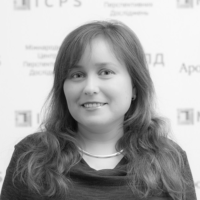
Olena Zakharova has been working for ICPS since August 2013. Between 2003-2013, she worked at the Political and Security Department of the Ministry of Foreign Affairs of Ukraine and at the Department for Association and European Integration of the Secretariat of the Cabinet of Ministers of Ukraine. Between 2007-2011, she was the First Secretary of the Embassy of Ukraine in Canada (Ottawa). She holds an M.A. in International Information from the Institute of International Relations at Taras Shevchenko National University of Kyiv.

Kassandra Becker is the chief operating officer of Polis180. Since mid-May, she has been responsible for the strategic direction of the grass-roots think tank and supports the volunteer board and members in all aspects.Kassandra studied her masters in European Studies and IR in Frankfurt and Poland. She participated in the Basic Track of Design Thinking at the Hasso Plattner Institute. After internships at ZDF, the Bundestag and the Heinrich Böll Foundation, she worked for the Körber Foundation in Berlin.
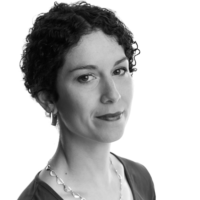
Regula Hess is a founding Member of Polis180 and member of the board of foraus, the Swiss role model to develop Polis180. She supports Polis180’s board and office regarding organizational development. Regula currently works at the Bundestag. She was previously employed by the Federal Ministry for Labour and Social Affairs and in the non-profit sector. She studied international relations and public policy in Geneva, Boston and Berlin.
